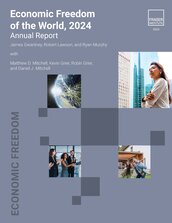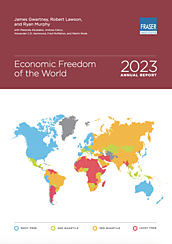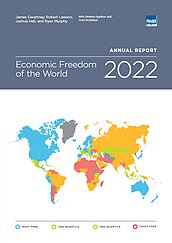This is the 30th edition of Economic Freedom of the World and this year’s publication ranks 165 countries and territories for 2023, the most recent year for which data are available.
Hong Kong continues to top the list as the world’s most economically free jurisdiction. But there is more to the story than the top-line rankings. Hong Kong’s overall score has declined by 0.52 points since 2018, led by significant declines in three of the five broad areas measured. The deterioration in the territory’s regulation and legal system and property rights areas is no doubt due to a notorious 2020 security law that ended China’s promise of “one country, two systems.”
The rankings of some other major countries are the United States (5th), Canada (11th), the United Kingdom (13th), Germany (15th), Japan (17th), Korea (38th), France (44th), Italy (46th), Indonesia (65th), Mexico (70th), India (86th), Brazil (87th), China (108th), and Russia (148th). The 10 lowest-rated countries are: Chad, Libya, Syria, Argentina, Myanmar, Iran, Algeria, Sudan, Zimbabwe, and Venezuela.
Overall, the index shows that economic freedom has increased since 2000, but fell precipitously following the coronavirus pandemic, erasing nearly a decade of progress.
Using U.S. tariff data from 2025, the report estimates that President Trump’s tariffs drop the United States from 56th to 76th place in the world in terms of freedom to trade and nearly knock the United States out of the top 10 in terms of overall economic freedom.
Nations in the top quartile of economic freedom had an average per capita GDP of $66,434 in 2023, compared to $10,751 for bottom quartile nations. Life expectancy is 79 years in the top quartile compared to 62 years in the bottom quartile.
The first Economic Freedom of the World Report, published in 1996, was the result of a decade of research by a team which included several Nobel Laureates and over 60 other leading scholars in a broad range of fields, from economics to political science, and from law to philosophy.




